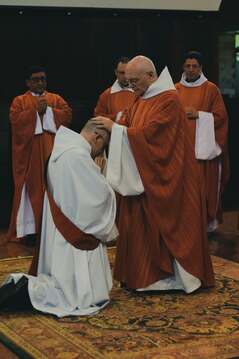Priesthood and the religious life
To act justly, love tenderly and walk humbly. Micah 6

If this is what God asks of us, the responsibility on our priests is surely great. The first task of a priest is to proclaim the Gospel, and then to lead the parish or Catholic community in worship at Mass, in celebrating the Sacraments, and in compassion for those in need.
One key element of the ceremony of Ordination is “the laying on of hands”, when in a tradition going back to the Apostles, the Bishop and fellow priests lay hands on the new priest and invoke the Holy Spirit. In these Holy Orders, the priest is again gifted the grace of the Holy Spirit so that as he carries out his ministerial work he is acting in the power of Christ, and not just on his own. Ordination is seen as creating a new person, one who is changed in this sacrament, not only because of what he can do, but because of what he has become. The priest retains all the human weaknesses and gifts he had before, and these gifts and weaknesses are used by God to serve the community through the priest.
If priests are seen as leaders and servants of their communities, similar roles are open to others, both men and women. Celebration of most of the sacraments is reserved to priests. Without priests, we are without the Eucharist. But deacons can celebrate Baptisms, officiate at weddings, conduct funerals, and preach at Mass. Similarly, religious sisters and lay Catholics often take on practical roles within the parish in our mission to develop our faith and support those in need.
Here at St Catherine’s we are fortunate to have Father John who is also the Director of Vocations for the Salford Diocese. Anyone interested in priesthood is invited to meet with Fr John to discuss opportunities to develop their faith and interest in priesthood.
One key element of the ceremony of Ordination is “the laying on of hands”, when in a tradition going back to the Apostles, the Bishop and fellow priests lay hands on the new priest and invoke the Holy Spirit. In these Holy Orders, the priest is again gifted the grace of the Holy Spirit so that as he carries out his ministerial work he is acting in the power of Christ, and not just on his own. Ordination is seen as creating a new person, one who is changed in this sacrament, not only because of what he can do, but because of what he has become. The priest retains all the human weaknesses and gifts he had before, and these gifts and weaknesses are used by God to serve the community through the priest.
If priests are seen as leaders and servants of their communities, similar roles are open to others, both men and women. Celebration of most of the sacraments is reserved to priests. Without priests, we are without the Eucharist. But deacons can celebrate Baptisms, officiate at weddings, conduct funerals, and preach at Mass. Similarly, religious sisters and lay Catholics often take on practical roles within the parish in our mission to develop our faith and support those in need.
Here at St Catherine’s we are fortunate to have Father John who is also the Director of Vocations for the Salford Diocese. Anyone interested in priesthood is invited to meet with Fr John to discuss opportunities to develop their faith and interest in priesthood.
It is no longer I who live, but Christ who lives in me. Galatians 2:20